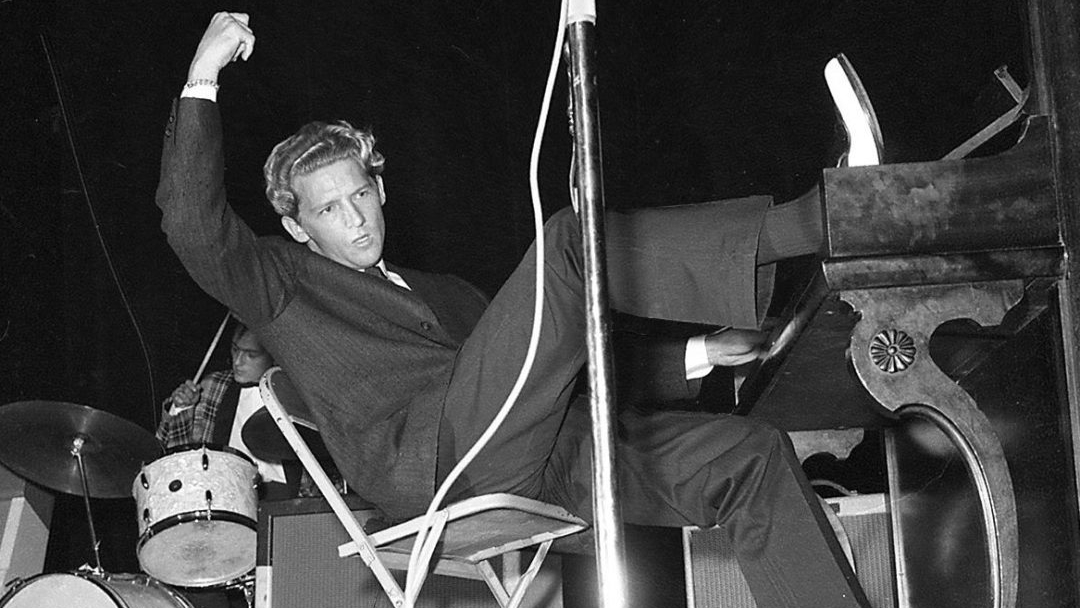Jerry Lee Lewis: Trouble in Mind
(USA, 73 min.)
Dir. Ethan Coen
He shook nerves and he rattled brains. He drove more than a few men insane with his antics, from heavy drinking to shooting the bass player in the chest. He helped define an entire genre of music, and when he was blackballed from that genre, he found new success in an expression even closer to home. He called everyone “Killer,” which, in turn, was a moniker applied to a man who attacked his keyboard with unique savagery. He was, and as of this writing still is, the Legend known as Jerry Lee Lewis.
Whether it be from the 1989 biopic starring Dennis Quaid and Winona Ryder, or simply from those familiar with early rock ‘n’ roll, Lewis’ highs and lows of a decades-long career are fairly well known. With Jerry Lee Lewis: Trouble in Mind, the Coen brother Ethan, along with his wife/collaborator Tricia Cooke serving as film editor, have assembled a warm retrospective of the man and his music. Employing a mountain of archival footage, including rare performance clips and dozens of interviews, the film manages to have the man tell his own story in all its shades, from the records that sold millions of units to some of his failed projects, descending popularity, and the backlash to his marriage to his cousin Myra Gale Brown.
On the surface, this is a pure celebration of the man, and there are worse ways of spending time watching a master performer at work. The first clip is solidly from his later country phase, an era that is certainly underappreciated by contemporary audiences. The headshaking and piano-bench flinging are gone by now, but the intensity of his block-chord playing, the pentatonic riffs played with Pentecostal fury, are still intact. We witness a legend then years into a career, playing a small TV studio free of screaming fans, and are simply allowed to revel in the musicality of his performance.
From here, we get a scattershot telling of his life that never quite follows a standard timeline but instead jumps back and forth between his many lives. The guidepost is always Jerry Lee, and given the numerous times he was asked on camera about even the tabloidiest of his exploits, he leads viewers through his many phases. This is not to say that he’s always a reliable narrator – even with his most problematic circumstances, he leans in further, slyly admitting during interview that Myra was actually 12 when they wed. (Records indicate that she was solidly 13 years old, if that makes a difference.) Throughout the film there’s a daring, perhaps self-destructive doubling-down from Lewis, so it’s easy to see how the biggest enemy to Jerry Lee’s success was his own mouth.
The film therefore doesn’t shy away from notorious aspects of his Biography, even as it does contextualize the circumstances and even allows Myra to speak in her own interview segments. Along with the half-dozen other wives, it’s clear that Lewis’ love Life is a complicated subject. The film explores this important facet of his personal life deftly.
The same subtlety is applied to his interaction with two other famous cousins, Jimmy Swaggart and Mickey Gilley. The dynamic between them is fascinating, given that Swaggart spent much of his career excoriating Jerry for his devilish behaviour, only to know be known primarily for his own predilections and sexual peccadillos that destroyed a lucrative televangelism empire. Mickey Gilley, on the other hand, is himself a remarkable musician rarely spoken of within the context of rock ‘n’ roll, yet he shows similar keyboard dexterity to Lewis within a country music milieu.
In fact, one clip that offers a fine duet between Lewis and Gilley allows one to witness the soft, if not false, borders that were set between gospel, blues, R&B, country, and rock ‘n’ roll during that period. The swing is there, and whether derived from the explosive performances of a Chitlin’ circuit-honed Little Richard, or the melodic bounce of Spade Cooley’s country swing, it’s all a melting pot from which the Killer drew.
Some of the performances presented in Trouble in Mind are frankly astonishing. Beyond the well-tread clips from the Steve Allen show and the like, Coen energizes the film with some obscure finds. Similarly, the vast range of the context for Lewis’ performances show explicitly that there truly was little to separate from the staccato-marked braggadocio of his younger self and the mildly subdued performances of his later years. They all reeked of the same intensity and calibre of play.
Jerry Lee Lewis: Trouble in Mind unfolds as these series of moments, only to be tied together, somewhat awkwardly, by end credit titles that only at the end provide a bit of biographical information about the man. It’s a strange choice to expect those to go along for the ride without knowing the context, but it’s a bold one, and at my screening most of the audience had gotten up and left before even realizing that was part of the running time.
Coen’s Jerry Lee Lewis film is straightforward yet satisfying. It’s welcome celebration of a giant of 20th century music. With its well-researched presentation and wide range of sources, it’s a boon for any viewers who are unaware of his legacy (wherever they may be) as well as Lewis’ long-time fans. It may not break new ground in documentary form or in the telling of Lewis’ own stories, but packaged this way, with its breathless editing rhythms sympathetic to the Killer’s own musical output, there’s a lot to admire about this film.
Jerry Lee Lewis: Trouble in Mind premiered at the 2022 Cannes Film Festival.












